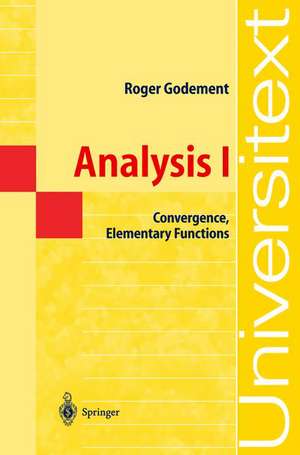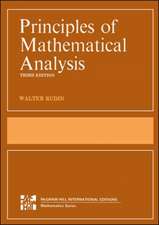Analysis I: Convergence, Elementary functions: Universitext
Autor Roger Godement Traducere de P. Spainen Limba Engleză Paperback – 18 noi 2003
Din seria Universitext
- 13%
 Preț: 353.49 lei
Preț: 353.49 lei -
 Preț: 487.96 lei
Preț: 487.96 lei - 15%
 Preț: 543.75 lei
Preț: 543.75 lei -
 Preț: 418.67 lei
Preț: 418.67 lei - 20%
 Preț: 628.22 lei
Preț: 628.22 lei -
 Preț: 322.62 lei
Preț: 322.62 lei - 17%
 Preț: 364.82 lei
Preț: 364.82 lei -
 Preț: 634.38 lei
Preț: 634.38 lei - 17%
 Preț: 427.32 lei
Preț: 427.32 lei - 13%
 Preț: 355.52 lei
Preț: 355.52 lei - 17%
 Preț: 431.50 lei
Preț: 431.50 lei - 19%
 Preț: 429.21 lei
Preț: 429.21 lei - 19%
 Preț: 393.81 lei
Preț: 393.81 lei -
 Preț: 360.08 lei
Preț: 360.08 lei -
 Preț: 358.44 lei
Preț: 358.44 lei - 13%
 Preț: 389.95 lei
Preț: 389.95 lei -
 Preț: 465.61 lei
Preț: 465.61 lei -
 Preț: 371.99 lei
Preț: 371.99 lei - 15%
 Preț: 497.22 lei
Preț: 497.22 lei - 15%
 Preț: 737.46 lei
Preț: 737.46 lei - 17%
 Preț: 394.41 lei
Preț: 394.41 lei - 15%
 Preț: 509.58 lei
Preț: 509.58 lei - 17%
 Preț: 427.68 lei
Preț: 427.68 lei - 8%
 Preț: 495.44 lei
Preț: 495.44 lei - 17%
 Preț: 364.57 lei
Preț: 364.57 lei - 17%
 Preț: 368.15 lei
Preț: 368.15 lei -
 Preț: 396.55 lei
Preț: 396.55 lei - 15%
 Preț: 553.33 lei
Preț: 553.33 lei - 17%
 Preț: 365.35 lei
Preț: 365.35 lei -
 Preț: 356.78 lei
Preț: 356.78 lei -
 Preț: 673.45 lei
Preț: 673.45 lei - 17%
 Preț: 426.76 lei
Preț: 426.76 lei - 20%
 Preț: 569.56 lei
Preț: 569.56 lei -
 Preț: 372.87 lei
Preț: 372.87 lei -
 Preț: 319.07 lei
Preț: 319.07 lei -
 Preț: 379.86 lei
Preț: 379.86 lei -
 Preț: 445.88 lei
Preț: 445.88 lei -
 Preț: 382.36 lei
Preț: 382.36 lei - 15%
 Preț: 533.72 lei
Preț: 533.72 lei - 15%
 Preț: 496.02 lei
Preț: 496.02 lei - 15%
 Preț: 474.82 lei
Preț: 474.82 lei -
 Preț: 389.70 lei
Preț: 389.70 lei -
 Preț: 484.08 lei
Preț: 484.08 lei - 15%
 Preț: 643.48 lei
Preț: 643.48 lei -
 Preț: 415.02 lei
Preț: 415.02 lei - 15%
 Preț: 602.25 lei
Preț: 602.25 lei - 20%
 Preț: 510.24 lei
Preț: 510.24 lei - 15%
 Preț: 588.37 lei
Preț: 588.37 lei -
 Preț: 381.59 lei
Preț: 381.59 lei
Preț: 480.69 lei
Preț vechi: 565.52 lei
-15% Nou
Puncte Express: 721
Preț estimativ în valută:
91.99€ • 95.69$ • 75.94£
91.99€ • 95.69$ • 75.94£
Carte tipărită la comandă
Livrare economică 14-28 aprilie
Preluare comenzi: 021 569.72.76
Specificații
ISBN-13: 9783540059233
ISBN-10: 3540059237
Pagini: 460
Ilustrații: XXI, 430 p. 1 illus.
Dimensiuni: 155 x 235 x 24 mm
Greutate: 0.69 kg
Ediția:Softcover reprint of the original 1st ed. 2004
Editura: Springer Berlin, Heidelberg
Colecția Springer
Seria Universitext
Locul publicării:Berlin, Heidelberg, Germany
ISBN-10: 3540059237
Pagini: 460
Ilustrații: XXI, 430 p. 1 illus.
Dimensiuni: 155 x 235 x 24 mm
Greutate: 0.69 kg
Ediția:Softcover reprint of the original 1st ed. 2004
Editura: Springer Berlin, Heidelberg
Colecția Springer
Seria Universitext
Locul publicării:Berlin, Heidelberg, Germany
Public țintă
Lower undergraduateCuprins
I Sets and Functions.- §1. Set Theory.- §2. The logic of logicians.- II - Convergence: Discrete variables.- §1. Convergent sequences and series.- §2. Absolutely convergent series.- §3. First concepts of analytic functions.- III - Convergence: Continuous variables.- §1. The intermediate value theorem.- §2. Uniform convergence.- §3. Bolzano-Weierstrass and Cauchy’s criterion.- §4. Differentiable functions.- §5. Differentiable functions of several variables.- Appendix to Chapter III.- 1 - Cartesian spaces and general metric spaces.- 2 - Open and closed sets.- 3 - Limits and Cauchy’s criterion in a metric space; complete spaces.- 4 - Continuous functions.- 5 - Absolutely convergent series in a Banach space.- 6 - Continuous linear maps.- 7 - Compact spaces.- 8 - Topological spaces.- IV Powers, Exponentials, Logarithms, Trigonometric Functions.- §1. Direct construction.- §2. Series expansions.- §3. Infinite products.- §4. The topology of the functions Arg(z) and Log z.
Recenzii
From the reviews of the original French edition:
"... The content is quite classical ... [...] The treatment is less classical: precise although unpedantic (rather far from the definition-theorem-corollary-style), it contains many interesting commentaries of epistemological, pedagogical, historical and even political nature. [...] The author gives frequent interesting hints on recent developments of mathematics connected to the concepts which are introduced. The Introduction also contains comments that are very unusual in a book on mathematical analysis, going from pedagogy to critique of the French scientific-military-industrial complex, but the sequence of ideas is introduced in such a way that readers are less surprised than they might be.
J. Mawhin in Zentralblatt Mathematik (1999)
From the reviews:
"Analysis I is the translation of the first volume of Godement’s four-volume work Analyse Mathématique, which offers a development of analysis more or less from the beginning up to some rather advanced topics. … the organization of the material is radically different … . It would … make excellent supplementary reading for honors calculus courses." (Gerald B. Folland, SIAM Review, Vol. 47 (3), 2005)
"A book on analysis that is quite different from all other books on this subject. … for those who essentially know the material (the level of an average graduate student, say), and who are interested in mathematics will certainly love reading it. Those who lecture this material may find a lot of inspiration to make their lessons entertaining." (Adhemar Bultheel, Bulletin of the Belgian Mathematical Society, Vol. 12 (2), 2005)
"Analysis I is an English translation of the first volume of a four-volume work. Analysis I consists of a spirally organized, organic, non-linear treatment of the introductory areas of ‘mathematical analysis as it was and as it has become’. It is infused with some excellent, sensitiveappreciations of the work of pioneers … and reads as a heady blend of both classical concerns and modern refinements, often illuminated by a variety of approaches." (Nick Lord, The Mathematical Gazette, March, 2005)
"... The content is quite classical ... [...] The treatment is less classical: precise although unpedantic (rather far from the definition-theorem-corollary-style), it contains many interesting commentaries of epistemological, pedagogical, historical and even political nature. [...] The author gives frequent interesting hints on recent developments of mathematics connected to the concepts which are introduced. The Introduction also contains comments that are very unusual in a book on mathematical analysis, going from pedagogy to critique of the French scientific-military-industrial complex, but the sequence of ideas is introduced in such a way that readers are less surprised than they might be.
J. Mawhin in Zentralblatt Mathematik (1999)
From the reviews:
"Analysis I is the translation of the first volume of Godement’s four-volume work Analyse Mathématique, which offers a development of analysis more or less from the beginning up to some rather advanced topics. … the organization of the material is radically different … . It would … make excellent supplementary reading for honors calculus courses." (Gerald B. Folland, SIAM Review, Vol. 47 (3), 2005)
"A book on analysis that is quite different from all other books on this subject. … for those who essentially know the material (the level of an average graduate student, say), and who are interested in mathematics will certainly love reading it. Those who lecture this material may find a lot of inspiration to make their lessons entertaining." (Adhemar Bultheel, Bulletin of the Belgian Mathematical Society, Vol. 12 (2), 2005)
"Analysis I is an English translation of the first volume of a four-volume work. Analysis I consists of a spirally organized, organic, non-linear treatment of the introductory areas of ‘mathematical analysis as it was and as it has become’. It is infused with some excellent, sensitiveappreciations of the work of pioneers … and reads as a heady blend of both classical concerns and modern refinements, often illuminated by a variety of approaches." (Nick Lord, The Mathematical Gazette, March, 2005)
Notă biografică
Roger Godement (October 1, 1921 - July 21, 2016) is known for his work in functional analysis, and also his expository books. He started as a student at the École normale supérieure in 1940, where he became a student of Henri Cartan. He started research into harmonic analysis on locally compact abelian groups, finding a number of major results; this work was in parallel but independent of similar investigations in the USSR and Japan. Work on the abstract theory of spherical functions published in 1952 proved very influential in subsequent work, particularly that of Harish-Chandra. The isolation of the concept of square-integrable representation is attributed to him. The Godement compactness criterion in the theory of arithmetic groups was a conjecture of his. He later worked with Jacquet on the zeta function of a simple algebra. He was an active member of the Bourbaki group in the early 1950s, and subsequently gave a number of significant Bourbaki seminars. He also took part in the Cartan seminar. He also wrote texts on Lie groups, abstract algebra and mathematical analysis.
Caracteristici
Prefers ideas to calculations Explains the ideas without parsimony of words Based on 35 years of teaching at Paris University Blends mathematics skilfully with didactical and historical considerations Includes supplementary material: sn.pub/extras














